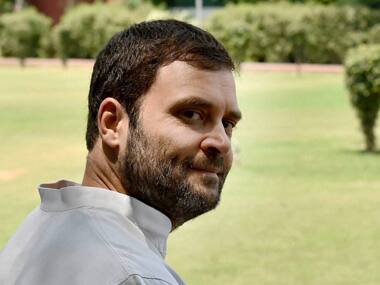Attempting hard to build a political consensus on the contentious GST Bill, the government has come thus far by indicating that it was yielding significant ground but the Congress is increasingly proving to be a tough customer. “I do not think the Congress party has moved away from its position. As of today our stand remains the same,” said Congress spokesperson and party MP Sushmita Dev making it amply clear that thaw between the two national parties is still illusive on the issue.[caption id=“attachment_2529592” align=“alignleft” width=“380”]  Congress vice president Rahul Gandhi. PTI[/caption] On the day when government’s Chief Economic Adviser Arvind Subramanian-led panel submitted its report on GST to Union Finance Minister Arun Jaitley, the Congress MP from Silchar in Assam chose to divulge details of what actually transpired at the meeting which Prime Minister Narendra Modi had held with Congress president Sonia Gandhi and former prime minister Manmohan Singh on GST. The meeting was also attended by Finance Minister Arun Jaitley and Parliamentary Affairs Minister Venkaiah Naidu. “I think in that meeting it was made crystal clear what the party stand was. The AICC (All India Congress Committee) president made it clear that whatever the concerns of the government were, she would take it back to the party leaders and discuss them. I would like to say that it is still being discussed and I believe that the Congress party has repeatedly said that logically the government of the day must debate it out,” the Congress spokesperson said. Interestingly the Congress chose to reiterate its position hours ahead of submission of the report on economic reforms by the Subramanin panel. Reports were already out earlier that the panel under Subramanian favoured capping of taxes around 18 percent and was also favourably posed to scrapping of 1 percent additional levy for manufacturing states like Tamil Nadu, Gujarat and Maharashtra. A statement by Skill Development Minister Rajiv Pratap Rudy proposing to levy an additional 2 percent cess on individual and corporate income tax seems to be the latest trigger which the Congress lapped it up to corner the government on GST. This cess, if approved, would be a part of the basket of 27 different kinds of cess and surcharges. Other than that, the Congress is already unhappy with the 0.5 percent Swachh Bharat cess that came into effect from 15 November this year. But unwilling to come so easily on the same platform as the government, Dev cited Rudy’s proposal for Skill India cess saying, “After seeing the trend of this government and with the recent intention that has been expressed by the skill development minister of yet another 2 percent tax, I have to say that the Congress party’s fear as to what would happen to GST, if the 18 percent rate was not ‘capped’ is real. This may even increase the financial burden that this government is seeking to impose on the common man. Therefore, I believe to some extent, in demanding the 18 percent ‘cap’ in GST, we find some vindication. I also hope that this government will roll back its announcement of 1 percent additional tax as we apprehend that this 1 percent will also eventually be borne by the common man and by the consumer.” The Congress is still not convinced on government’s argument as to why capping on taxes could not be mentioned in a constitutional amendment. Even the Subramanian panel has not agreed with the Congress in this regard. Perhaps it could be a solace to the Congress that the Subramanian panel recommended doing away with one percent additional levy by manufacturing states and was also weighing the option of list tax rates in accompanying legislation other than the Constitutional amendment. The government has succeeded in roping in support from most regional parties and is not inclined to push for the bill till it gets Congress on board. As of now, it may be reckoned that the Congress may be doing this tough posturing to claim credit for introducing certain amendments in the GST bills and making the government yield under its pressure. The party will obviously credit its vice president Rahul Gandhi for that. How the whole issue pans out politically and be dealt with in Parliament will be clear in the next few days when the government refreshes its contacts with the Congress. For senior ministers in the government days of realpolitik negotiations with Congress lay ahead.
The government has succeeded in roping in support from most regional parties and is not inclined to push for the bill till it gets Congress on board.
Advertisement
End of Article


)
)
)
)
)
)
)
)
)



